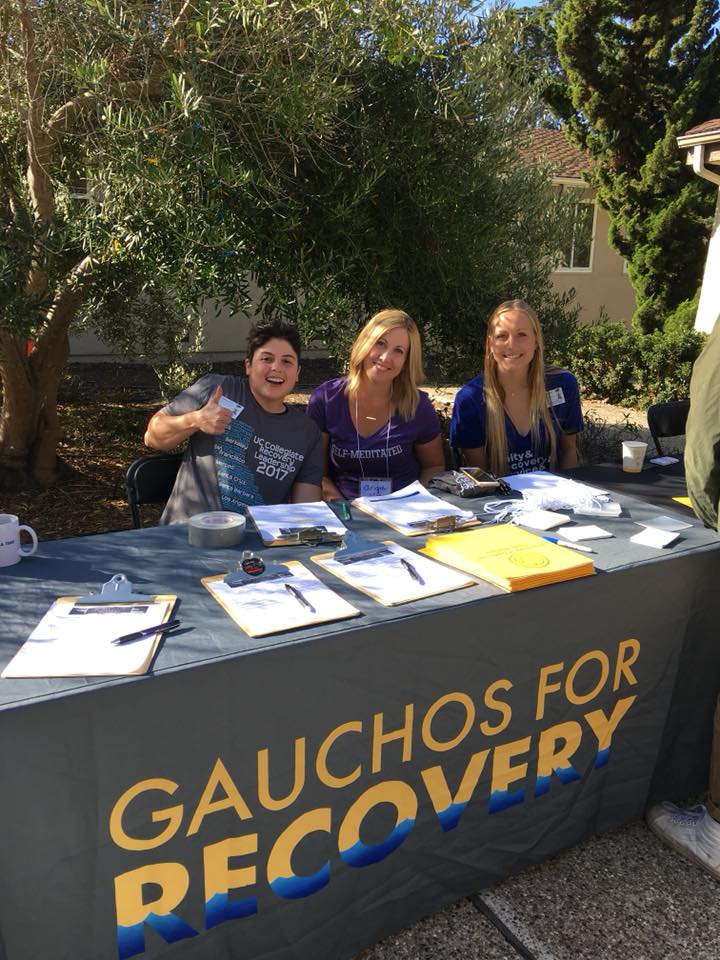
Nicholas Torrano
Gauchos for Recovery is a collegiate alcohol and drug recovery support group that provides a safe and wholesome space for both frequent members and newcomers on a weekly basis.
Unlike UCSB’s Alcohol and Drug Program, which mandates that certain students attend meetings, nobody is ordered to attend Gauchos for Recovery sessions; students return because they want to be there. Gauchos for Recovery is more focused on community-led recovery than the Alcohol and Drug Program, helping students feel comfortable enough to get back on their feet on their own terms.
As I sat down with a group of long-time members and staff, a warm and welcoming energy spread throughout the room. Gauchos for Recovery hosts several different types of meetings to accommodate recovering students of varying demographics with various needs. For example, the organization offers a meeting that supports non-traditional students, such as veterans, undergrads who are twenty-five and older, and students with dependents. In addition, the program holds a number of events to provide bonding time, such as bowling nights, unity trips (pizza outings), and two annual camping trips.
Since the founding of the program in fall of 2012, Gauchos for Recovery has seen significant growth. A “fifty-percent attendance increase,” according to the organization’s end of the year report. To put that into perspective, the program “consistently draws in 20-30 people each week,” according to a more recent report. Additionally, the program has added two more meetings since the new school year: the Alanon meeting and the Graduate/Non-Traditional Student Open 12-step meeting.
Angie Bryan, the founder, counselor, manager, and supervisor of Gauchos for Recovery, said in an interview with The Bottom Line that she started the organization because she wanted to prevent UCSB’s student population from contributing to the national statistics of substance abuse among young people age 18-25.
She said she is pleased to normalize collegiate recovery services, as this program is “the first of its kind among the UC system and a rarity for colleges in general” because universities shy away from acknowledging negative issues in order to maintain prestige.
The organization’s increasing funding has gone towards expanding and re-energizing the meeting facility with a new desk, additional lighting, and new wall decor. These new add-ons contribute to a more ideal space for comfort and productivity. The end of the year report also highlighted an “increase in recovery peer outreach contacts,” meaning there is more availability for one-on-one peer recovery counseling. Naturally, with the expansion of the program there are more opportunities for events and retreats as well as an increase in community awareness.
I was also fortunate enough to interview a variety of the organization’s student leaders: Noah Shachar, a fourth year physics student and peer recovery intern, Gretchen Horbol, a fourth year student in environmental studies and peer recovery intern, Tommy Travis, a non-traditional, fourth year environmental studies major and event and outreach officer, and Chelsea Jones, a Ph.D student in cinema studies and a peer recovery intern.
Shachar and Horbol emphasized the group’s goal of eliminating the misleading stigma associated with the term “addict.” Common associations with the term “addict” are homelessness or the implication that the user must be in his or her’s older years.
Shachar told The Bottom Line that “the group prefers to use terms like ‘a person in long-term recovery,’ because it has a more positive association than what we envision when someone is called ‘an alcoholic or drug addict.’ The term [person in long-term recovery] also highlights that recovery is a ongoing process of self-betterment. People have the misconception that if you have a problem, one trip to rehabilitation and then the problem is over, when that may not always be the case.”
“Realizing that other students my age were in the same position as me made a huge difference in my journey as a person in recovery. It is so important that we have a collegiate recovery program because there is a stigma behind addiction which says you can only get sober when you are older. Unfortunately, that is when it may be more of a problem. We are continually trying to change that stigma to invite younger people who want to get help,” Horbol said.
The program is located in Embarcadero Hall Room 1105, the entrance that is facing across from Aladdin Cafe. You can also learn more about the Gaucho for Recovery on their website.










